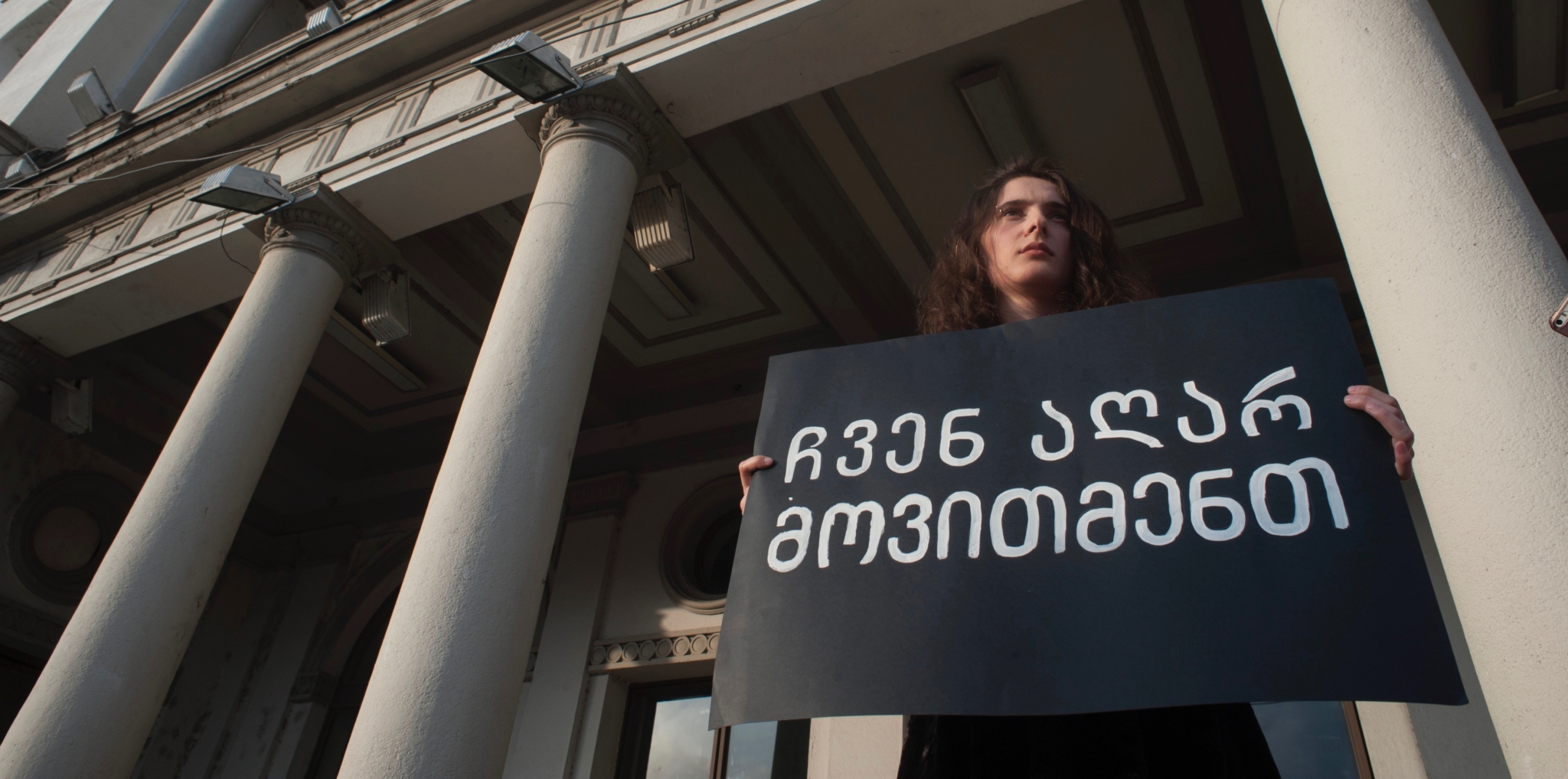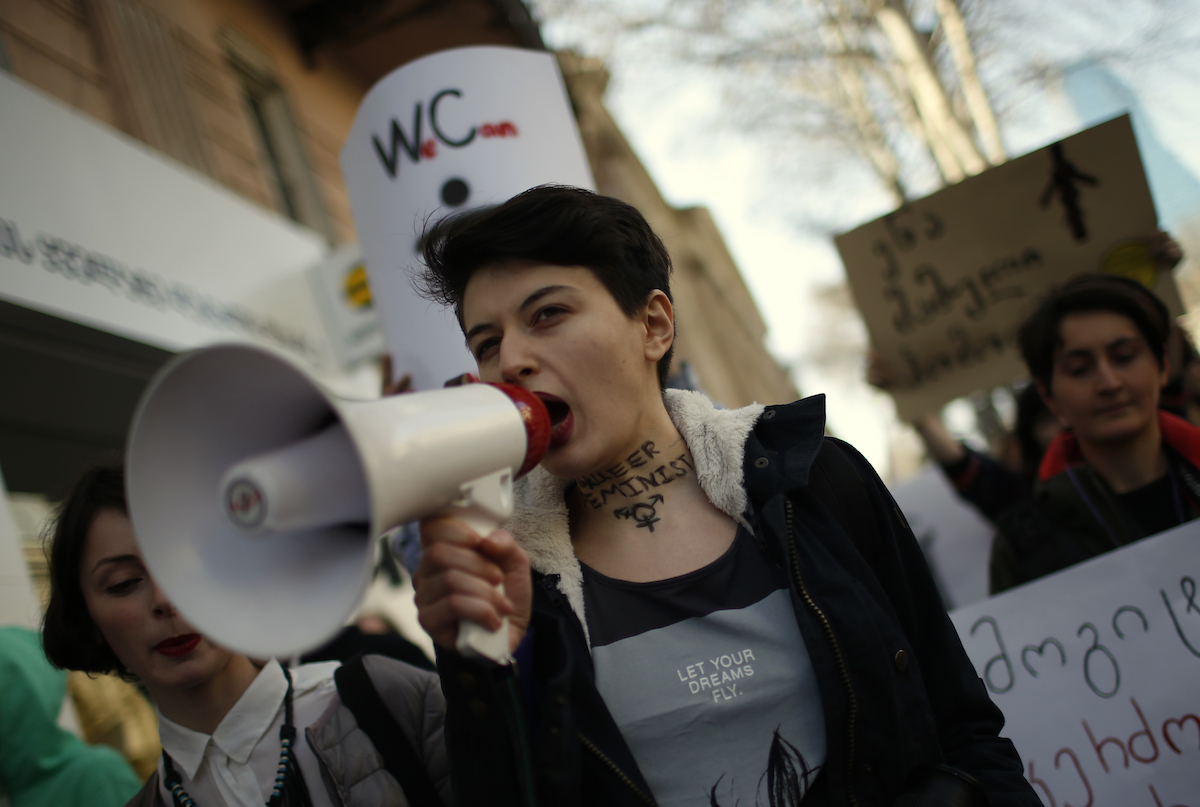ABCs of feminism: What are women fighting for?
What is feminism?

On 8 March, the world celebrates International Women’s Day. Over the past century, women have achieved a great deal in the fight for their rights. For example, they now take part in elections and can decide for themselves whether or not they want to have children – and how many.
Still, there’s a long road ahead before true equality is reached. Those leading the way are called feminists. JAMnews has decided to explore who they are, what they’re striving for, and what feminism actually means.
Let’s address the most common stereotypes.
_____________________________________________
Does feminism mean that women will replace men and take over leadership in all areas?
No, that wouldn’t be feminism – that would be matriarchy.
Feminism opposes domination of any kind. On the contrary, supporters of the movement call for equal rights and opportunities for both women and men. Feminists protest against discrimination and gender-based violations of women’s rights. By law, a woman is just as much a citizen of her country as a man is. Therefore, she should have the same political, economic, and civil rights as a man.
Feminists hate men, oppose the institution of family, don’t shave their armpits, and are all lesbians anyway.
Feminism is not a fight against men, but against patriarchy – the system in which power, at every level of public life – politics, family, business – is concentrated in the hands of men.
Feminism isn’t defined by sexual orientation or number of children. Some feminists are stay-at-home mums, some have large families. There are feminists who get plastic surgery and pose on the covers of glossy magazines.

What about physiology? Do feminists believe that women and men are the same?
No feminist in their right mind would claim that. Of course, women and men are physiologically different. But that’s where the difference ends – there should be no difference when it comes to civil rights.
In fact, no two people are the same. Everyone differs in physical traits and abilities – people can be Black or white, tall or short, slim or full-figured, some have perfect pitch, others are physically strong, or brilliant at solving maths problems. But before the law, they are all equal.
Besides, are men’s physical traits ever considered when appointing them to leadership roles? If physiological differences truly mattered when hiring, then company directors would be chosen through an arm-wrestling tournament rather than an interview.
In reality, physiology has become so prominent in public life because stereotypes are ingrained from early childhood. At nursery, in school, on the street, and at home – we constantly hear that men should be brave, decisive and strong, while women should be gentle, caring, honest, and decent.
According to Georgian and Orthodox traditions, a woman must obey a man. And in general, feminism and religion are incompatible.
Let’s start with religion – and clarify what exactly we mean by that: faith, as in our personal relationship with the divine, our individual spiritual search; or the Church, as an organised institution.
If we’re talking about faith – then feminism and religion are entirely compatible. After all, for a believer, God is just, and all people are equal before Him. And that is precisely what feminism is about – achieving equality for all.
If we mean the Church – then historically, it is a deeply patriarchal institution. Some branches of the Church have undergone partial reform in the 20th century to align more closely with modern values. But others, like the Orthodox Church, remain traditional and conservative. The Orthodox Church tries to preserve its patriarchal nature and maintain control over women, even though inequality contradicts the core dogmas of the faith.
As for Georgian traditions – why don’t men go to work wearing traditional chokhas and carrying daggers? The world has changed, and many outdated customs no longer have a place in it – especially those that restrict someone’s freedom.
When it comes to great composers or artists – where are the women?
In fact, there are plenty of talented female composers. But the question itself is flawed – and here’s why.
Yes, in music, painting, science and other fields, we hear far more about male geniuses than female ones. But if we take a closer look at human history – did men and women really have equal opportunities to develop their talents? For thousands of years, women were excluded from intellectual life altogether. They weren’t even allowed to get an education, let alone nurture or use their skills.
It’s entirely possible that there were female Leonardo da Vincis or Raphaels – but humanity lost them, simply because they were never given the chance to pick up a paintbrush.
History offers many examples of women using male pseudonyms as the only way to express themselves and be taken seriously.
In the US, women couldn’t vote until 1920. In the UK – not until 1928. And in Saudi Arabia, women were only granted the right to vote in 2015.
Why do feminists speak on behalf of all women? Not every woman wants or demands equality.

Women are often trapped by stereotypes and even agree with ideas like “all women are silly.” Some proudly say that most of their friends are men – distancing themselves from the “silly ones” and implying they possess a “man’s mind.”
There are also women who believe in equality but don’t want to be labelled feminists. This is because feminism is often marginalised – feminists are portrayed as aggressive, bitter women who’ve failed in their personal lives.
But no one is demanding that women give up family life or stop cooking. No one is saying that living that way is wrong. That’s not the point at all. What matters is the freedom to choose. Feminists are fighting for a woman’s right to decide for herself – whether or not to have children, whether or not to start a family, whether to play football, get plastic surgery, or keep her natural look.
But when girls grow up being told that the two most important events in their life are a wedding and childbirth, making a free choice becomes incredibly difficult.
An outdated education system doesn’t help either – something that becomes especially clear during themed TV talk shows.
Another reason many women never even consider the idea of equality is financial dependence. Often, they are entirely reliant on men and live according to the script written by their “provider.”
Can men be feminists?
Millions of men around the world have embraced feminist views. Here’s one of them:

In truth, the patriarchal structure of the world has harmed men too – and in theory, equality should suit them just as well.
Gender stereotypes may have “locked women in a cage,” but they’ve also forced men to conform to society’s idea of what a “real man” should be. He must provide for the family and never show weakness. From the age of two, boys are told not to cry – “You’re a man!”
Society frowns when men take on “women’s” roles – cooking in the kitchen or caring for children. A man who stays home with the kids while his wife is on a business trip is called a “hero.” But has anyone ever called a woman a “heroine” for changing a nappy?
Men who take up synchronised swimming or enjoy knitting are viewed with suspicion. You may remember the comments on Facebook when a photo of the Georgian president holding knitting needles went viral.
The core message of feminism is this: no one should be forced to live according to prescribed roles.
Everyone should be free to do what brings them joy and live the life they choose – not the one chosen for them by a husband or wife, an aunt, a neighbour, or their brother-in-law’s mother.
Is it possible to agree with feminists without being an activist?
Of course it is. But feminists are rarely quiet – they encounter injustice at every turn. Even something as simple as getting behind the wheel can prompt smirks or comments. And yet, statistics show that women break traffic laws far less often than men.
Feminism does imply taking a stand – but how you express that is entirely up to you. You don’t have to join street protests if you’re busy with work. But if you’re denied a job purely because you’re a woman, you should take it to court.
It’s all just hype stirred up by NGOs to get grants. In reality, Georgia achieved gender equality long ago – Queen Tamar, after all, held the official title of king in the 12th century
It’s true that Georgian law prohibits discrimination based on age or gender. But the reality tells a different story. Just visit job listing websites: most companies still advertise managerial roles for men, while women are offered jobs as cooks, cleaners, or waitresses. Women face greater obstacles in science and serious wage discrimination.
There’s also a widespread belief that women don’t really need career progression – that what they truly need is “women’s happiness”: a family and a loving husband who will protect and provide for them.
The fact that women have far fewer opportunities for career growth is backed up by research. In 2016, sociologists compared data from 217 countries and found the following:
Housework, cooking, and caring for children or elderly relatives takes up an average of 23 years of a woman’s life. Meanwhile, men are largely free from these responsibilities. On average, women spend twice as much time on domestic tasks as men – and this often forces them to give up on education or career ambitions.
Feminists are just attention-seekers – they’ve never actually achieved anything real.
If it weren’t for feminists, women today wouldn’t have the right to vote, access higher education, take part in politics, play football, or hold leadership positions. All of these rights were won by women themselves, through their own struggle for equality.
Women’s public engagement and participation in business are highly beneficial for the economy. A 2016 study across 91 countries showed that companies with women in leadership roles tend to be more profitable. This is backed by UN data: the more educated and employed women there are in a country, the stronger its economic growth.
Moreover, higher levels of female education in a country are linked to lower child mortality rates.
So did feminists achieve everything? What are they still fighting for today?
Unfortunately, not everything has been achieved yet.
There is still a significant gender pay gap. Depending on the country and age group, women can earn between 0.5% and 52.9% less than men for the same work.
Domestic violence remains a serious issue. In many cases, it’s not even recognised as a crime. In rape cases, the victim is often blamed for what happened.
Crimes against women that are justified by patriarchal traditions still persist – forced marriage, bride kidnapping, so-called “honour killings,” female genital mutilation, abortion bans, and the sexual exploitation of women.
All of this still occurs in present-day Georgia.
According to data presented at the 2016 World Economic Forum, the most rights for women were recorded in Ireland, Finland, and Norway. The worst conditions were observed in Saudi Arabia, Syria, Pakistan, and Yemen, where 92% of women have no stable personal income.


















